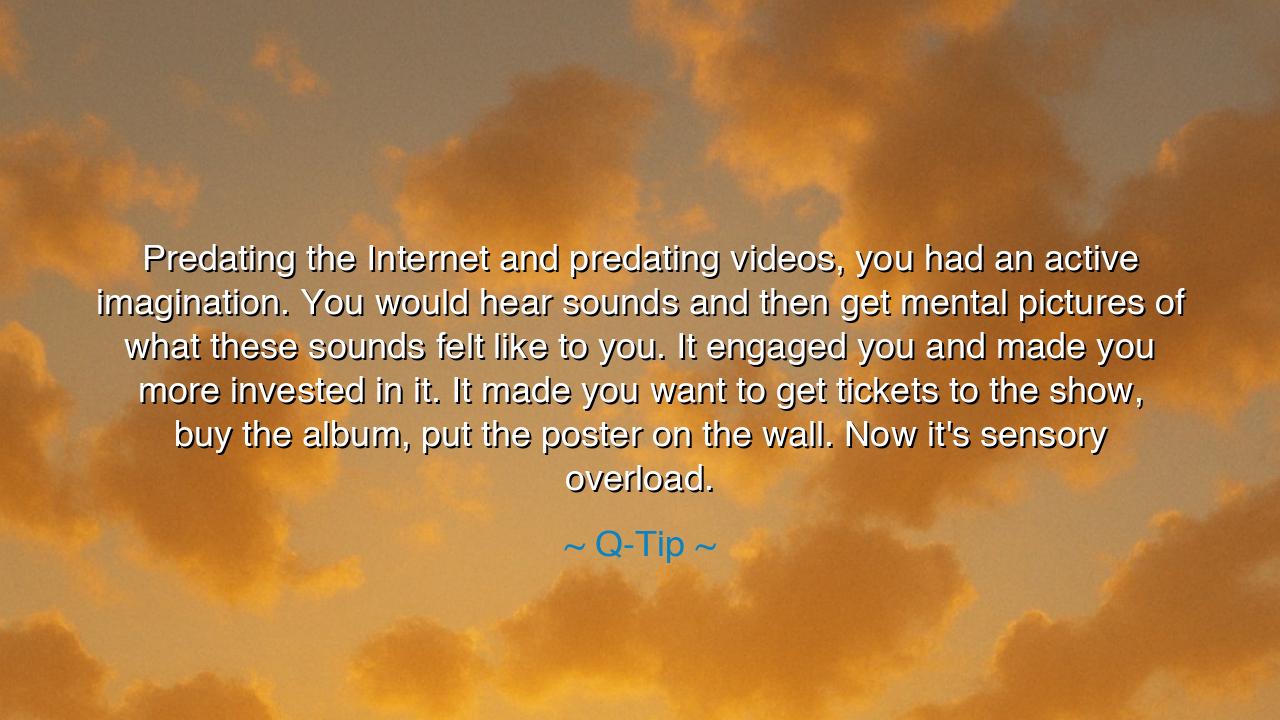
Predating the Internet and predating videos, you had an active
Predating the Internet and predating videos, you had an active imagination. You would hear sounds and then get mental pictures of what these sounds felt like to you. It engaged you and made you more invested in it. It made you want to get tickets to the show, buy the album, put the poster on the wall. Now it's sensory overload.






“Predating the Internet and predating videos, you had an active imagination. You would hear sounds and then get mental pictures of what these sounds felt like to you. It engaged you and made you more invested in it. It made you want to get tickets to the show, buy the album, put the poster on the wall. Now it's sensory overload.” — thus spoke Q-Tip, the poet and philosopher of rhythm, whose words echo like a heartbeat beneath the noise of the modern age. In this reflection lies not mere nostalgia, but a lament for a fading art — the art of imagination, the sacred act by which the unseen becomes vivid, and the distant becomes personal. His words remind us that once, before the glowing screens and endless streams, music was not something we watched — it was something we felt.
In the elder days, sound was the bridge between worlds. A song, when heard through the radio or from a spinning record, entered not only the ear but the mind’s eye. There, imagination painted its own pictures — the singer’s face, the concert lights, the stories behind every lyric. The listener became co-creator, joining the artist in the act of invention. Music was not yet spectacle; it was an invitation to dream. What Q-Tip mourns is not technology itself, but the quiet death of that inner participation — the moment when the listener ceased to imagine and began only to consume.
The ancients would have understood this loss well. They, too, valued the unseen. When the bards of old sang their epics, there were no screens, no images — only words, rhythm, and the boundless imagination of those who listened. A campfire’s flicker became the battlefield of heroes; the sound of a lyre became the song of the sea. Every listener created their own world, unique and alive. This, Q-Tip reminds us, was the true power of art: not to overwhelm the senses, but to awaken the inner vision. When the eyes are given everything, the mind forgets how to see.
Consider the tale of Orson Welles, who in 1938 brought the world to the edge of panic with his radio play The War of the Worlds. There were no images, no moving pictures — only sound. Yet through that sound, he conjured such a vivid terror in the minds of his audience that many believed the earth was under attack. That event, astonishing and absurd, proved how mighty imagination once was — that a mere voice could summon an entire apocalypse. Such was the creative power of the listener, before the age of endless images dulled the inner eye.
Q-Tip’s lament carries another truth: that overstimulation breeds apathy. Where once we listened with hunger, now we scroll without feeling. The flood of media drowns our attention, and the sacred act of listening becomes rare. To be moved by art, one must engage it — lean toward it, dream with it, give it space to echo. But when every sense is crowded, imagination cannot breathe. The world becomes louder, yet our hearts grow quieter. The soul, like the ear, needs silence to truly hear.
Yet in his words there is not only mourning, but hope. For imagination is not dead — it only sleeps beneath the glare of our devices, waiting to be awakened. Each of us holds within us that same ancient faculty, the power to hear and see beyond the surface. When we close our eyes and listen — really listen — we rebuild the bridge that once connected artist and listener, spirit and sound. The path back is not through rejecting the modern world, but through reclaiming our inner world.
And so, the lesson of Q-Tip’s wisdom is clear: guard your imagination. Feed it not only with what is given, but with what you create within. When you listen to music, let it paint your own visions — the faces, the colors, the stories only you can see. Step away from the flood of constant images, and rediscover the joy of participation — of letting sound become sight, and feeling become story. For imagination is the soul’s most ancient instrument, and it grows dull only when unused.
Thus, let us return to the stillness that once gave birth to wonder. Let us listen again with the ears of our ancestors — with patience, with depth, with reverence. For though the world is loud, the imagination still waits in silence. And when it awakens, the music we hear will not only fill the room — it will fill the universe within us.






AAdministratorAdministrator
Welcome, honored guests. Please leave a comment, we will respond soon